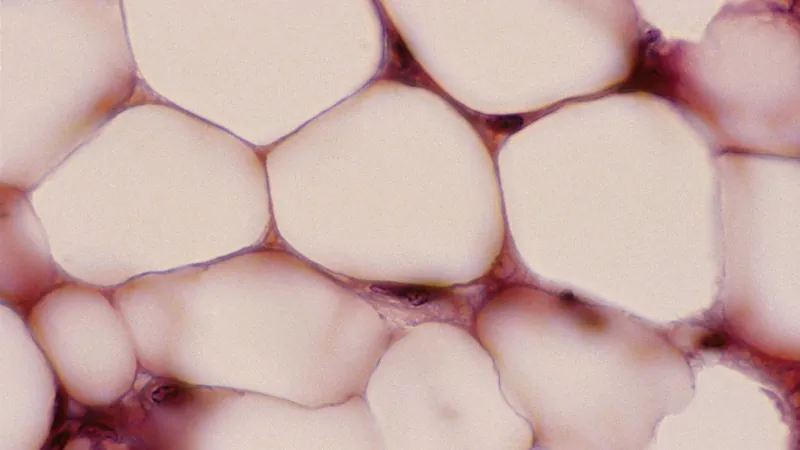
The Hidden "Memory" of Fat Cells: Why Losing Weight Might Keep You from Staying Slim
2024-11-29
Author: Yan
Losing weight is often a challenging journey, and many find that as soon as they shed those extra pounds, the weight creeps back on. A groundbreaking study has revealed that fat cells could be holding onto a “memory” of obesity, making them more prone to growth when reintroduced to high-fat foods. This discovery sheds light on the complex relationship between our bodies and weight loss, raising questions about the reasons behind the frustrating phenomenon of weight regain.
Understanding the Science Behind Weight Regain
Dr. Katherine H. Saunders, an obesity physician at Weill Cornell Medicine, emphasizes that this research challenges the long-held belief that weight cycling is solely due to a lack of willpower. The study, published in the prestigious journal *Nature*, suggests a far deeper biological component might be at play. It highlights the role of **epigenetic markers**, which are chemical modifications on DNA that help fat cells retain a memory of their previous state.
While our DNA doesn't change dramatically throughout life, how our body interprets this genetic code can vary significantly. These epigenetic modifications can alter how fat cells behave, causing them to respond more vigorously to calorie-rich diets even after losing weight.
The Experiment on Mice
Researchers conducted a sophisticated experiment on mice, first feeding them a high-fat diet before returning them to a normal diet to observe their weight loss. While these mice returned to their original weight, an examination of their fat cells revealed they retained the epigenetic markers associated with their previous weight gain. This suggests that even after shedding pounds, their cells were still influenced by their past obesity.
Human Implications
To extend these findings to humans, the team analyzed fat cells from individuals who had undergone bariatric surgery. They discovered patterns of gene activity indicating that similar epigenetic changes persisted after the patients lost weight. Laura Hinte, a doctoral student involved in the study, noted that fat cells undergo an “identity crisis” during obesity, and this study indicates that such changes may linger long after weight loss.
Furthermore, the scientific team noticed that fat cells taken from previously obese mice regained size more quickly when exposed to glucose and fatty substances compared to cells from control mice. This suggests a heightened sensitivity to high-calorie diets, underlining the difficulty many face when trying to maintain weight loss.
Broader Implications of 'Memory' in Cells
The implications of this research extend beyond fat cells. Hinte suggests that “memory” could exist in other types of cells, including neurons, potentially influencing appetite regulation in those who have lost weight.
Cautions and Future Research
While the study provides compelling evidence for the role epigenetic changes may play in weight regain, it stops short of proving causation. Dr. Fatima Cody Stanford from Harvard Medical School cautions that the behaviors observed in lab mice may not completely mirror human obesity, hinting at the complexity of metabolic processes in humans.
Conclusion
Importantly, the findings underscore a critical message: early intervention in weight management may be crucial. As we seek ways to combat the obesity epidemic, the research suggests that understanding and addressing the biological underpinnings of weight fluctuations could lead to more effective strategies for lasting weight loss.
So, if you’ve struggled with yo-yo dieting, you’re not alone. This new research opens a window into why maintaining weight loss is so challenging, adding a new layer of understanding to an age-old battle against the scales. Stay tuned as the scientific community continues to untangle the mysteries of how our bodies manage weight in the face of an environment laden with temptation!


 Brasil (PT)
Brasil (PT)
 Canada (EN)
Canada (EN)
 Chile (ES)
Chile (ES)
 España (ES)
España (ES)
 France (FR)
France (FR)
 Hong Kong (EN)
Hong Kong (EN)
 Italia (IT)
Italia (IT)
 日本 (JA)
日本 (JA)
 Magyarország (HU)
Magyarország (HU)
 Norge (NO)
Norge (NO)
 Polska (PL)
Polska (PL)
 Schweiz (DE)
Schweiz (DE)
 Singapore (EN)
Singapore (EN)
 Sverige (SV)
Sverige (SV)
 Suomi (FI)
Suomi (FI)
 Türkiye (TR)
Türkiye (TR)